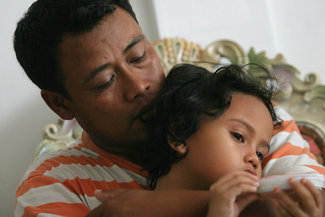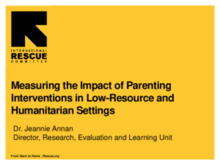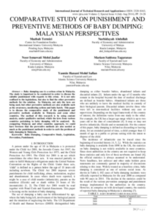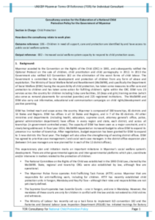

Displaying 571 - 580 of 752
This presentation from IRC, given at the State of the Evidence on Children’s Care Symposium, outlines the findings of recent research on parenting interventions in low-resource settings.
According to the article, the Social and Family Development Ministry of Singapore is looking to better help children in foster care or homes. Minister Chan Chun Sing said the key thrust is to provide a more "homely" environment for the children.
This animated video, made for an Australian audience, illustrates the orphanage industry in Cambodia, particularly how Australian “voluntourists” unwittingly contribute to the exploitation and traumatization of children in orphanages.
La Thaïlande maintient chaque année en détention des milliers d’enfants migrants, leur causant des dommages émotionnels et physiques, a déclaré Human Rights Watch dans un rapport. Des enfants migrants et demandeurs d’asile sont détenus de manière inutile dans des lieux de rétention sordides et des cellules de la police, en raison de leur statut en matière d’immigration ou de celui de leurs parents.
Officials in Hanoi have recently investigated a philanthropic institution, Bo De Pagoda, which housed children and older adults and have found that the institution “suffered loose management and offered substandard healthcare” in addition to allegations of child trafficking, says Ha An of Than Nien News.
This video features a segment of a talk on the effects of care environments on children, hosted by the Christian Alliance for Orphans. The key speakers featured include Dr. Kathryn Whetten & Dr. Charles Nelson, who discuss the Positive Outcomes for Orphans study (POFO) and the Bucharest Early Intervention Project (BEIP), respectively.
This article analyses the interactions among global and national actors in the policy dynamics of Cambodia’s National Social Protection Strategy (NSPS); it is intended to disentangle the complex politics of global social policy at the national level.
Analyzing Malaysian and international practices in regards to “baby-dumping,” the authors of this research article are raising awareness of the punitive approach of the criminal justice system in handling baby dumping cases in Malaysia and other countries, as well as the limited, although important, prevention opportunities.
The government of Myanmar is embarking on the development of a national child protection policy – the first of its kind for the country – and has asked for UNICEF technical assistance to support the drafting process.
"About 21 per cent of children or more than three million children in Thailand do not live with either of their parents due to internal migration, a significant phenomenon that may have a long-term impact on the children’s development and well-being," says this press release from UNICEF.



